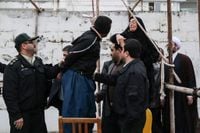In the city of Qom, Iran, the government executed a man on October 18, 2025, after convicting him of spying for Israel’s Mossad intelligence agency. According to the official judiciary news agency Mizan and multiple international outlets including AFP and WANA, the execution was carried out at Qom Prison following confirmation by Iran’s Supreme Court and the rejection of a clemency request. The man’s identity has not been disclosed by authorities, a detail that has drawn criticism from human rights organizations and international observers alike.
The charges against the executed individual were severe: "enmity against God" (moharebeh) and "corruption on earth" (efsad fel-arz), both of which are capital offenses under Iran’s Islamic penal code. As reported by Mizan and confirmed by WANA, the man began collaborating with Israeli intelligence in October 2023. He was arrested in February 2024 after what officials described as comprehensive intelligence investigations and the collection of what they termed "complete evidence."
Kazem Mousavi, the chief justice of Qom province, stated that the accused confessed to collaborating with Mossad, transmitting classified information online, and even meeting a Mossad officer. According to Mousavi, "The individual had established contact with Israeli intelligence due to personal and professional motives, held meetings with a Mossad officer, and began transmitting classified data online to Israel." Mousavi also claimed that swift action by Iranian intelligence and judicial authorities prevented the leakage of sensitive information.
The conviction was issued under Article 6 of the Law on Combating Hostile Actions of the Israeli Regime Against Peace and Security, as well as for collaboration with hostile foreign governments, including the U.S. Department of State, according to WANA. The Supreme Court later upheld the death sentence, and all requests for pardon or clemency were denied.
This latest execution is part of a much broader and intensifying campaign by Iranian authorities to root out what they describe as espionage and sabotage networks linked to Israel. The timing follows a turbulent period after a 12-day war between Iran and Israel earlier in 2025, which saw Israeli airstrikes on Iranian military sites and Iranian missile barrages against Israeli territory. The conflict resulted in around 1,100 deaths, including senior Iranian military commanders, according to official counts cited by media outlets such as AFP.
Since the June conflict, Iran has executed at least nine individuals accused of espionage for Israel, as reported by the UN special rapporteur on human rights in Iran and corroborated by news agencies like Mizan and AFP. Saturday’s execution brings the total to at least twelve individuals executed on espionage charges this year, with the majority occurring after the June 13 Israeli military strike on Iran.
The crackdown has not been limited to a handful of cases. WANA reported that Iranian security forces arrested over 700 individuals allegedly affiliated with Israeli intelligence in just 12 days following the most recent Israeli attack. Iranian officials claim that the Israeli regime’s espionage network became highly active across the country during this period, prompting a sweeping response. The judiciary has credited these mass arrests and executions with protecting national security and thwarting further acts of sabotage.
Several high-profile executions have taken place since the summer. On September 17, 2025, Babak Shahbazi, a contractor in the industrial sector with ties to telecommunications, military, and security organizations, was executed after being convicted of espionage and collaboration with Mossad. Shahbazi’s case, like many others, was confirmed by the Supreme Court before the execution was carried out. Later that month, on September 29, Bahman Choobi Asl, a database specialist and senior manager with access to sensitive governmental databases, was hanged in Arak Prison for deliberately collaborating with Israeli intelligence.
In August, Roozbeh Vadi, a PhD graduate in nuclear engineering who worked in Iran’s nuclear facilities, was executed for passing information about a nuclear scientist killed during Israeli airstrikes in June. Iranian officials have alleged that Vadi supplied details regarding an Iranian nuclear scientist who was targeted and killed, underscoring the high stakes and the deep mistrust between the two nations.
Iranian authorities have also claimed that some spies were recruited through unconventional means, including Google Ads campaigns. According to WANA, advertisements designed to attract potential spies were delivered through various applications, with Israel allegedly involved in the recruitment process. The claim, while difficult to independently verify, highlights the increasingly digital and global nature of modern espionage operations.
Beyond the headline-grabbing executions, Iran’s judiciary has repeatedly justified its use of the death penalty for espionage and terrorism-related offenses. Officials argue that such measures are necessary to protect national security in the face of what they describe as Israel’s "infiltration and sabotage operations." The government accuses Israel of orchestrating covert attacks inside Iran, including the assassinations of nuclear scientists and cyber sabotage of strategic facilities.
However, these actions have drawn sharp criticism from human rights organizations and Western governments. Groups like Amnesty International have condemned Iran’s growing use of capital punishment, especially for political and espionage-related offenses. Critics argue that many convictions rely on coerced confessions and that trials are often held behind closed doors without access to independent legal representation. According to the UN special rapporteur, Iran is the world’s second most prolific executioner after China.
The international community’s response has been mixed. While some governments have called for greater transparency and due process in Iran’s judicial system, others have focused on the broader regional implications of the escalating conflict between Iran and Israel. The series of executions and mass arrests have heightened tensions in a region already on edge, with both sides exchanging accusations of sabotage, terrorism, and covert warfare.
The execution in Qom, a city about 120 kilometers south of Tehran and home to a sacred Shiite shrine, is just the latest chapter in a long-running shadow war between Iran and Israel. As both nations continue to clash on the military, intelligence, and diplomatic fronts, the human cost of this conflict remains painfully clear. For the families of those executed and for the broader Iranian public, the government’s campaign against alleged spies is both a warning and a reflection of the high-stakes struggle playing out behind closed doors.
With each new execution, Iran signals its determination to confront what it sees as existential threats. Yet as the cycle of accusation, arrest, and execution continues, questions about justice, transparency, and human rights grow ever more urgent—both within Iran and far beyond its borders.






